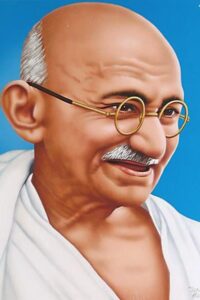Biography
ISC# 02101869

Early life and background
Mohandas Karamchand Gandhi was born on 2 October 1869 into a Gujarati Hindu Modh Bania family in Porbandar (also known as Sudamapuri), a coastal town on the Kathiawar Peninsula and then part of the small princely state of Porbandar in the Kathiawar Agency of the Indian Empire. His father, Karamchand Uttamchand Gandhi (1822–1885), served as the dewan (chief minister) of Porbandar state.
Although he only had an elementary education and had previously been a clerk in the state administration, Karamchand proved a capable chief minister. During his tenure, Karamchand married four times. His first two wives died young, after each had given birth to a daughter, and his third marriage was childless. In 1857, Karamchand sought his third wife’s permission to remarry; that year, he married Putlibai (1844–1891), who also came from Junagadh, and was from a Pranami Vaishnava family. Karamchand and Putlibai had three children over the ensuing decade: a son, Laxmidas (c. 1860–1914); a daughter, Raliatbehn (1862–1960); and another son, Karsandas (c. 1866–1913).
On 2 October 1869, Putlibai gave birth to her last child, Mohandas, in a dark, windowless ground-floor room of the Gandhi family residence in Porbandar city. As a child, Gandhi was described by his sister Raliat as “restless as mercury, either playing or roaming about. One of his favourite pastimes was twisting dogs’ ears.”The Indian classics, especially the stories of Shravana and king Harishchandra, had a great impact on Gandhi in his childhood. In his autobiography, he admits that they left an indelible impression on his mind. He writes: “It haunted me and I must have acted Harishchandra to myself times without number.” Gandhi’s early self-identification with truth and love as supreme values is traceable to these epic characters.
The family’s religious background was eclectic. Gandhi’s father Karamchand was Hindu and his mother Putlibai was from a Pranami Vaishnava Hindu family. Gandhi’s father was of Modh Baniya caste in the varna of Vaishya. His mother came from the medieval Krishna bhakti-based Pranami tradition, whose religious texts include the Bhagavad Gita, the Bhagavata Purana, and a collection of 14 texts with teachings that the tradition believes to include the essence of the Vedas, the Quran and the Bible. Gandhi was deeply influenced by his mother, an extremely pious lady who “would not think of taking her meals without her daily prayers… she would take the hardest vows and keep them without flinching. To keep two or three consecutive fasts was nothing to her.
In 1874, Gandhi’s father Karamchand left Porbandar for the smaller state of Rajkot, where he became a counsellor to its ruler, the Thakur Sahib; though Rajkot was a less prestigious state than Porbandar, the British regional political agency was located there, which gave the state’s diwan a measure of security.In 1876, Karamchand became diwan of Rajkot and was succeeded as diwan of Porbandar by his brother Tulsidas. His family then rejoined him in Rajkot. Gandhi (right) with his eldest brother Laxmidas in 1886.
At age 9, Gandhi entered the local school in Rajkot, near his home. There he studied the rudiments of arithmetic, history, the Gujarati language and geography. At age 11, he joined the High School in Rajkot, Alfred High School. He was an average student, won some prizes, but was a shy and tongue tied student, with no interest in games; his only companions were books and school lessons.
In May 1883, the 13-year-old Mohandas was married to 14-year-old Kasturbai Makhanji Kapadia (her first name was usually shortened to “Kasturba”, and affectionately to “Ba”) in an arranged marriage, according to the custom of the region at that time. In the process, he lost a year at school but was later allowed to make up by accelerating his studies. His wedding was a joint event, where his brother and cousin were also married. Recalling the day of their marriage, he once said, “As we didn’t know much about marriage, for us it meant only wearing new clothes, eating sweets and playing with relatives.” As was prevailing tradition, the adolescent bride was to spend much time at her parents’ house, and away from her husband.
Writing many years later, Mohandas described with regret the lustful feelings he felt for his young bride, “even at school I used to think of her, and the thought of nightfall and our subsequent meeting was ever haunting me.” He later recalled feeling jealous and possessive of her, such as when she would visit a temple with her girlfriends, and being sexually lustful in his feelings for her.
In late 1885, Gandhi’s father Karamchand died. Gandhi, then 16 years old, and his wife of age 17 had their first baby, who survived only a few days. The two deaths anguished Gandhi.The Gandhi couple had four more children, all sons: Harilal, born in 1888; Manilal, born in 1892; Ramdas, born in 1897; and Devdas, born in 1900.
In November 1887, the 18-year-old Gandhi graduated from high school in Ahmedabad. In January 1888, he enrolled at Samaldas College in Bhavnagar State, then the sole degree-granting institution of higher education in the region. But he dropped out and returned to his family in Porbandar.
Three years in London
Student of law
Gandhi came from a poor family, and he had dropped out of the cheapest college he could afford. Mavji Dave Joshiji, a Brahmin priest and family friend, advised Gandhi and his family that he should consider law studies in London. In July 1888, his wife Kasturba gave birth to their first surviving son, Harilal. His mother was not comfortable about Gandhi leaving his wife and family, and going so far from home. Gandhi’s uncle Tulsidas also tried to dissuade his nephew. Gandhi wanted to go. To persuade his wife and mother, Gandhi made a vow in front of his mother that he would abstain from meat, alcohol and women. Gandhi’s brother Laxmidas, who was already a lawyer, cheered Gandhi’s London studies plan and offered to support him. Putlibai gave Gandhi her permission and blessing.
On 10 August 1888, Gandhi aged 18, left Porbandar for Mumbai, then known as Bombay. Upon arrival, he stayed with the local Modh Bania community whose elders warned him that England would tempt him to compromise his religion, and eat and drink in Western ways. Despite Gandhi informing them of his promise to his mother and her blessings, he was excommunicated from his caste. Gandhi ignored this, and on 4 September, he sailed from Bombay to London, with his brother seeing him off. Gandhi attended University College, London, a constituent college of the University of London.Gandhi in London as a law student
At UCL, he studied law and jurisprudence and was invited to enroll at Inner Temple with the intention of becoming a barrister. His childhood shyness and self-withdrawal had continued through his teens. He retained these traits when he arrived in London, but joined a public speaking practice group and overcame his shyness sufficiently to practise law.
He demonstrated a keen interest in the welfare of London’s impoverished dockland communities. In 1889, a bitter trade dispute broke out in London, with dockers striking for better pay and conditions, and seamen, shipbuilders, factory girls and other joining the strike in solidarity. The strikers were successful, in part due to the mediation of Cardinal Manning, leading Gandhi and an Indian friend to make a point of visiting the cardinal and thanking him for his work.
Vegetarianism and committee work
Gandhi’s time in London was influenced by the vow he had made to his mother. He tried to adopt “English” customs, including taking dancing lessons. However, he did not appreciate the bland vegetarian food offered by his landlady and was frequently hungry until he found one of London’s few vegetarian restaurants. Influenced by Henry Salt’s writing, he joined the London Vegetarian Society and was elected to its executive committee under the aegis of its president and benefactor Arnold Hills. An achievement while on the committee was the establishment of a Bayswater chapter. Some of the vegetarians he met were members of the Theosophical Society, which had been founded in 1875 to further universal brotherhood, and which was devoted to the study of Buddhist and Hindu literature. They encouraged Gandhi to join them in reading the Bhagavad Gita both in translation as well as in the original.
Gandhi had a friendly and productive relationship with Hills, but the two men took a different view on the continued LVS membership of fellow committee member Thomas Allinson. Their disagreement is the first known example of Gandhi challenging authority, despite his shyness and temperamental disinclination towards confrontation.
Allinson had been promoting newly available birth control methods, but Hills disapproved of these, believing they undermined public morality. He believed vegetarianism to be a moral movement and that Allinson should therefore no longer remain a member of the LVS. Gandhi shared Hills’ views on the dangers of birth control, but defended Allinson’s right to differ. It would have been hard for Gandhi to challenge Hills; Hills was 12 years his senior and unlike Gandhi, highly eloquent. He bankrolled the LVS and was a captain of industry with his Thames Ironworks company employing more than 6,000 people in the East End of London. He was also a highly accomplished sportsman who later founded the football club West Ham United. In his 1927 An Autobiography, Vol. I, Gandhi wrote:
The question deeply interested me…I had a high regard for Mr. Hills and his generosity. But I thought it was quite improper to exclude a man from a vegetarian society simply because he refused to regard puritan morals as one of the objects of the society
A motion to remove Allinson was raised, and was debated and voted on by the committee. Gandhi’s shyness was an obstacle to his defence of Allinson at the committee meeting. He wrote his views down on paper but shyness prevented him from reading out his arguments, so Hills, the President, asked another committee member to read them out for him. Although some other members of the committee agreed with Gandhi, the vote was lost and Allinson excluded. There were no hard feelings, with Hills proposing the toast at the LVS farewell dinner in honour of Gandhi’s return to India.
Called to the bar
Gandhi, at age 22, was called to the bar in June 1891 and then left London for India, where he learned that his mother had died while he was in London and that his family had kept the news from him.[59] His attempts at establishing a law practice in Bombay failed because he was psychologically unable to cross-examine witnesses. He returned to Rajkot to make a modest living drafting petitions for litigants, but he was forced to stop when he ran afoul of a British officer Sam Sunny.
In 1893, a Muslim merchant in Kathiawar named Dada Abdullah contacted Gandhi. Abdullah owned a large successful shipping business in South Africa. His distant cousin in Johannesburg needed a lawyer, and they preferred someone with Kathiawari heritage. Gandhi inquired about his pay for the work. They offered a total salary of £105 (~$17,200 in 2019 money) plus travel expenses. He accepted it, knowing that it would be at least a one-year commitment in the Colony of Natal, South Africa, also a part of the British Empire.
Source : Workshopnews
